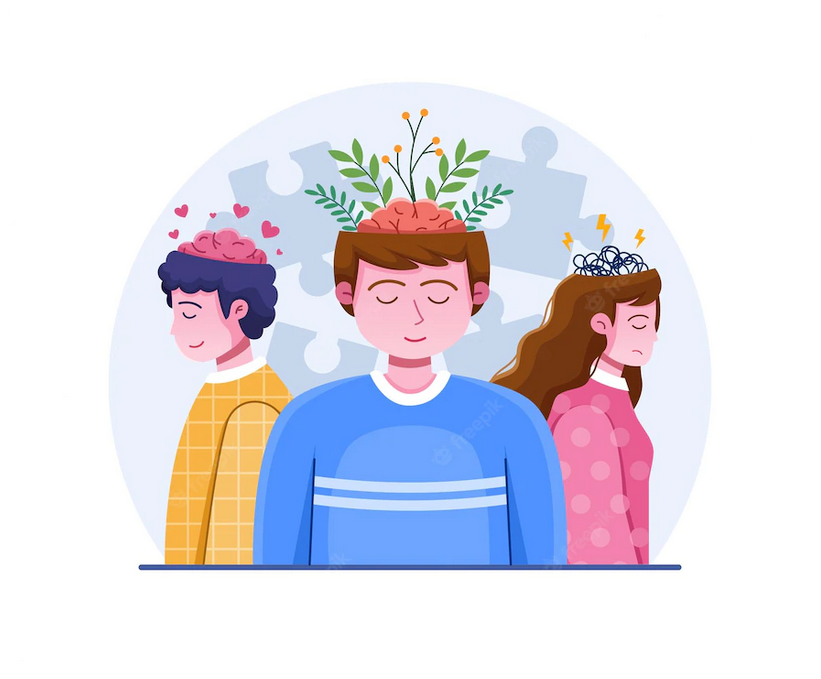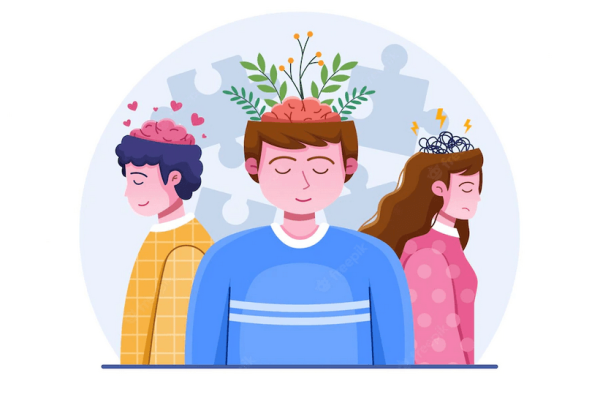Physical health and mental health are two intimately connected aspects of our overall well-being, and their relationship has gained increasing recognition in recent years. This blog tells about the intricate connection between physical and mental health, emphasizing the paramount importance of mental health in our daily lives. Additionally, it offers a comprehensive guide on how to maintain and enhance mental well-being, shedding light on the significance of prioritizing this crucial facet of our health.
The Connection Between Physical and Mental Health
1.Biological Connection:
At its core, physical and mental health are intricately linked on a biological level. The brain, the epicenter of our mental well-being, is an organ seamlessly connected to our overall bodily health. Neurotransmitters, hormones, and various physiological processes within the body significantly influence our emotions, mood, and cognitive functions. For instance, imbalances in neurotransmitters like serotonin can precipitate mood disorders like depression and anxiety.
2. Lifestyle Factors:
Lifestyle choices are a powerful determinant of both physical and mental health. Regular exercise, a balanced diet, and adequate sleep contribute not only to physical health but also have a profound impact on our mental state. Exercise, in particular, is renowned for releasing endorphins, often referred to as “feel-good” hormones, which alleviate stress, boost mood, and improve overall mental well-being.
3. Stress and Inflammation:
Chronic stress, a prevalent consequence of the modern lifestyle, can lead to an array of physical health issues, including cardiovascular diseases, obesity, and immune system dysregulation. Importantly, stress also contributes significantly to mental health problems such as anxiety, depression, and even more severe conditions like post-traumatic stress disorder (PTSD). Prolonged stress triggers the release of cortisol, a hormone linked not only to inflammation but also to mental health disorders.
4. The Gut-Brain Connection:
Emerging scientific research has uncovered the intricate gut-brain connection, demonstrating the gut’s substantial role in influencing mental health. A healthy gut can boost mental well-being by helping with neurotransmitters and the immune system. Conversely, poor gut health can contribute to conditions like irritable bowel syndrome (IBS) and impact mental health through the gut-brain axis.

Signs to look out for to identify if you have mental health problems
- Persistent Sadness or Mood Changes
- Increased Irritability or Anger
- Changes in Sleep Patterns
- Changes in Appetite or Weight
- Loss of Interest
- Withdrawal and Isolation
- Difficulty Concentrating
- Physical Symptoms
- Excessive Worry or Anxiety
- Fatigue
- Cognitive Changes
- Substance Use Changes
- Impaired Functioning
- Suicidal Thoughts or Self-Harm
- Hallucinations or Delusions
- Excessive Guilt or Shame
- Mood Swings
- Increased Risk-Taking
- Avoidance of Responsibilities
- Neglect of Personal Hygiene
Why mental health holds paramount importance in our daily lives?
1. Quality of Life:
Mental health stands as a cornerstone that significantly shapes our overall quality of life. When individuals enjoy good mental health, they are more likely to relish life’s moments, cultivate positive relationships, and engage wholeheartedly in fulfilling activities. Conversely, poor mental health can cast a shadow over one’s existence, hindering the ability to find joy and satisfaction in daily activities.
2. Productivity and Performance:
Mental health plays an indispensable role in one’s ability to excel at work, succeed in academics, and navigate every facet of life effectively. A mentally fit individual is better equipped to concentrate, make informed decisions, and tap into their creative potential. In essence, a healthy mind serves as an invaluable asset for productivity and success.
Physical Health:
The interplay between mental and physical health is a two-way street. Poor psychological health can contribute to the development of physical health conditions, while physical ailments can exacerbate mental health challenges. Prioritizing mental health can lead to better physical health outcomes and vice versa.
Social Connections:
A thriving social life and psychological well-being share a symbiotic relationship. By maintaining good emotional health, individuals can communicate effectively, empathize with others, and establish meaningful social connections. Consequently, these relationships offer invaluable support and contribute positively to mental well-being.
Resilience:
Mental well-being is instrumental in cultivating resilience when facing adversity. Individuals with good psychological fitness are better equipped to cope with life’s inevitable challenges, bounce back from setbacks, and adapt to evolving circumstances with grace and strength.
Ways to Maintain and Elevate Mental Well-being
1. Self-awareness:
Commence your journey towards robust mental well-being by nurturing self-awareness. Recognize your emotions, identify triggers, and gain insights into your patterns of thinking. This heightened self-awareness serves as the foundation for effectively managing stressors and preserving overall well-being.
2. Seek Support:
Acknowledge that seeking professional help when needed is not a sign of weakness but a courageous step toward healing. Therapists, counsellors, and support groups provide invaluable guidance and a safe space to navigate mental health challenges.
3. Practice Mindfulness:
Mindfulness techniques, such as meditation and deep breathing exercises, offer profound benefits in reducing stress, increasing emotional resilience, and fostering an overall sense of inner peace.
4. Maintain a Healthy Lifestyle:
Prioritize your physical health through regular exercise, a balanced diet, and ample restorative sleep. These habits, often underestimated in their impact, not only benefit your body but also have a significant bearing on your mental well-being.
5.Cultivate Social Connections:
Dedicate time to nurture your social connections. Therefore, spend quality moments with loved ones, reach out to friends, and participate in activities that foster social interaction and emotional support.
6.Effective Stress Management:
Develop personalized strategies for managing stress effectively. This might encompass time management techniques, relaxation practices, or engaging in hobbies that facilitate relaxation and emotional release. Additionally, incorporating these strategies into your daily routine can significantly enhance your overall well-being.
7. Set Realistic Goals:
Establish realistic and achievable goals, breaking them down into manageable tasks. Each successful step toward your aspirations can boost your self-esteem and contribute positively to your overall well-being.
8. Embrace Resilience:
Cultivate resilience by viewing setbacks as opportunities for growth. Develop a positive mindset that allows you to learn from challenges, adapt to change, and consequently, emerge stronger on the other side.
9. Limit Screen Time:
Exercise discretion when it comes to screen time, particularly on social media platforms. Excessive digital exposure can contribute to feelings of inadequacy, anxiety, and isolation. Periodic digital detoxes and mindfulness regarding your online consumption can be highly beneficial.
10. Prioritize Self-care:
Understand that self-care is not a selfish endeavor but an essential investment in your mental well-being. Dedicate time to activities that bring you joy, whether it’s reading, painting, taking nature walks, or simply indulging in a relaxing bath.
The intricate connection between physical and mental health underscores the vital significance of mental well-being in our daily lives. It permeates every facet of our existence, influencing our quality of life, productivity, physical health, social connections, and resilience in the face of adversity. To maintain and enhance mental well-being, one must cultivate self-awareness, seek support when necessary, practice mindfulness, prioritize a healthy lifestyle, nurture social connections, manage stress effectively, set realistic goals, embrace resilience, limit screen time, and above all, prioritize self-care. By actively tending to our mental health, we pave the way for a brighter, healthier, and more fulfilling life, ultimately allowing us to thrive in the complex tapestry of the human experience.

